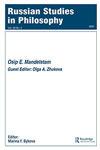The Concept of Activity as the Basis of Research of L. S. Vygotsky’s School of Psychology
IF 0.1
4区 哲学
Q4 Arts and Humanities
引用次数: 0
Abstract
ABSTRACT The author proves that, despite the opinion prevalent among historians of psychology, the concept of “practical, sensuous activity” was present in Vygotsky’s work from the very beginning of his studies; moreover, it determined their general direction. Following Marx, Vygotsky regarded the tool-based nature of human activity as its specific trait. Psychological activity is likewise mediated by means of tools of a special kind—the “verbal signs”; using these social tools, man masters his own behavior. Having been able to trace the origins of consciousness to practical activity, to “life,” Vygotsky did not go into the concrete specifics of this process and set about searching for the primeval source of consciousness in the “emotional sphere.” His disciple Alexey Leontiev resumed the study of the practical genesis of the psyche, having started a new stage in the development of the cultural–historical theory. In conclusion, the author of the article analyzes the weak points of today’s psychology of activity and points out the necessity of combining the activity-based and the sign–symbolic approaches in the science of man.作为维果茨基心理学派研究基础的活动概念
摘要:本文证明,尽管心理学史家普遍认为“实践的、感性的活动”这一概念从维果茨基的研究之初就存在于他的著作中;此外,它还决定了它们的大方向。继马克思之后,维果茨基将人类活动的工具性视为其特有的特征。心理活动同样是通过一种特殊的工具——“语言符号”来中介的;利用这些社会工具,人类掌握了自己的行为。维果茨基已经能够将意识的起源追溯到实践活动,追溯到“生活”,但他并没有深入到这一过程的具体细节中,而是开始在“情感领域”寻找意识的原始来源。他的弟子阿列克谢·列昂捷夫(Alexey Leontiev)恢复了对心灵实践起源的研究,开启了文化历史理论发展的新阶段。最后,分析了当今活动心理学的薄弱环节,指出了在人学研究中,将活动理论与符号-象征理论相结合的必要性。
本文章由计算机程序翻译,如有差异,请以英文原文为准。
求助全文
约1分钟内获得全文
求助全文
来源期刊

RUSSIAN STUDIES IN PHILOSOPHY
PHILOSOPHY-
CiteScore
0.10
自引率
0.00%
发文量
14
期刊介绍:
Russian Studies in Philosophy publishes thematic issues featuring selected scholarly papers from conferences and joint research projects as well as from the leading Russian-language journals in philosophy. Thematic coverage ranges over significant theoretical topics as well as topics in the history of philosophy, both European and Russian, including issues focused on institutions, schools, and figures such as Bakhtin, Fedorov, Leontev, Losev, Rozanov, Solovev, and Zinovev.
 求助内容:
求助内容: 应助结果提醒方式:
应助结果提醒方式:


